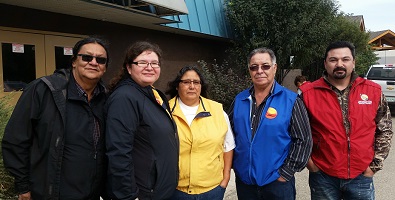Concerns about a one-sided retelling of history are coming out now that the University of Manitoba is on the cusp of rolling out documents that up until a month ago were in the hands of the church and Aboriginal Affairs.
The National Centre for Truth and Reconciliation (NCTR) is holding meetings with residential school survivors and their families to find out how they want that information to be released. The NCTR is based out of the University of Manitoba, and will release an online database once it’s met with survivors around the country.
On Thursday, the centre made a stop in Prince Albert, where about 30 survivors gathered to discuss the respectful way to do so.
One issue that came up within talks was that Indian Affairs staff had what the group calls a racist bias towards its students and their families.
“Especially with the residential school documents, these are reports that are written by the writer themselves with a view of our people that’s not too positive. So they write their report to their supervisors, to the government officials to justify to oneself and others that they’re doing a good job or trying to justify their action,” said Robert Fiddler.
He attended residential school in Beauval and Lebret.
During the talks, he pointed out that there are two perspectives – that of the report writers, and that of indigenous peoples. Fiddler and others expressed a desire for both viewpoints to be made public.
“For the University of Manitoba to house the half-truths” is concerning to me, Fiddler said, with nods of approval from others present.
The afternoon was emotional for many, some wiping their eyes and covering their faces as people spoke.
A sample document of an admission document that actually came from a Prince Albert Residential School shared sensitive information related to the family. The name was blacked out, and people in the room read what it had to say.
Linda O’Soup says it struck a chord.
“At that time it was some of my family that was coming to school here and other people from the reserve. And we’re a small reserve so when that document came up it could have been someone I was related to, like an aunt or an uncle or a brother that they were talking about,” she said.
Still, she says it’s important that information gets out there to inform non-aboriginal people about the past.
During the meeting, another man mentioned that some survivors still harbour ill will towards those who abused them.
“You could use that information to hurt someone,” he said.
Ryan Moran, the director of the centre, said the balance between privacy and the importance of sharing documents on Canada’s residential school history is one of the many things he struggles with.
However, he did have a positive note. Moran told the room that getting the massive number of documents from aboriginal affairs and churches and into the hands of the NCTR a month ago was a victory.
The power has been “taken out of the hands of the perpetrator,” Moran said.
